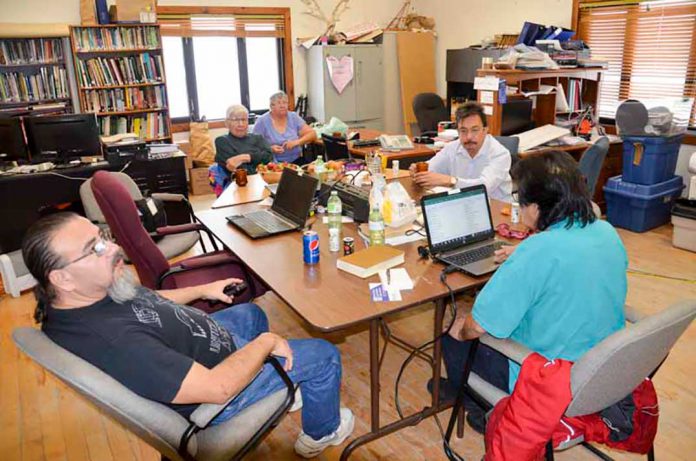By Petra Wall
Mickey McKinny
Mickey McKinney and his wife are part of the increasing number of people who have chosen Manitoulin Island as their new home in retirement.
Ben Leeson of the Sudbury Star wrote on May 8, 2013, “When Mickey McKinny enters the ‘House of Kin Sudbury Sports Hall of Fame’, he’ll be among friends. A long-time player and coach in several sports, including hockey and fastball, McKinny was either a teammate of, or a mentor to, several past inductees and likely some future ones as well,” Mickey worked with players like Dale McCourt, Rod Shutt, Don Duguay and John Baby among others…”
Mickey was also proud to win the ‘Sudbury Sportsman of the Year’ honours in 1970 and equally proud to have participated in the World Softball Championship in 1961 in Florida. He also coached and helped sponsor the All Ontario team to a win in 1969 in Quebec, another highlight of his multi-faceted career. For 12 years, he was a police constable, later becoming a detective sergeant for 13 more. First and foremost, he was a dedicated husband to Cathy and their children.
“I was born on May 8, 1936 to a single mom. My father had returned to Australia. After two years, my mother asked her friends, Phil and Ida Page of Sudbury, to take care of me. They had three daughters, one of whom was Margaret, who would look out for me. My mom promised to return one day, but sadly, she never did.” Mickey shares. “The Pages were kind to me. They registered me as Michael Page in school but my birth certificate said I was still a McKinny.” Mickey kept his name, hoping he would see his mum again.
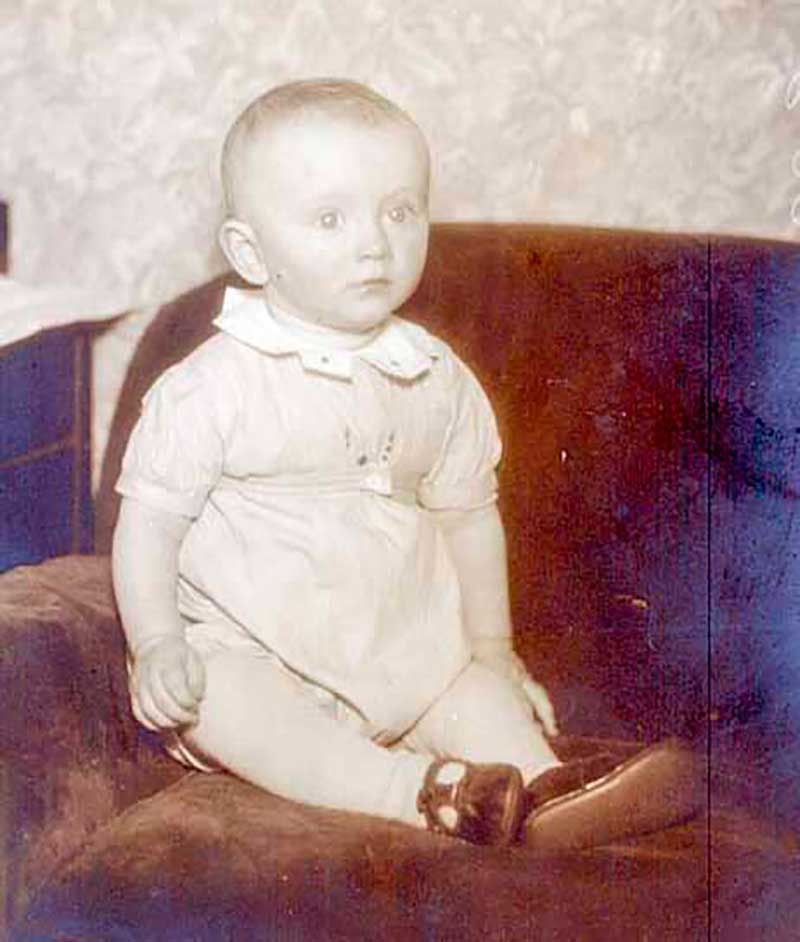
He got used to life with the Pages and their three daughters. They lived in a French community nestled between the golf course and O’Connor Park in Sudbury. “I quickly learned to speak French.” Mr. Page was a hard-working man, employed at Laberge Lumber Mill in the evenings and during the day he was a mechanic for CNR. He also sharpened skates in his garage. “His work ethic rubbed off on me. One day, Mr. Page handed me a bag and told me I could get a dollar each time I filled it with coal from the railroad track. I have to admit I occasionally snuck under the fence at the Laberge coal yard and grabbed extra chunks if I couldn’t find enough on the tracks.”
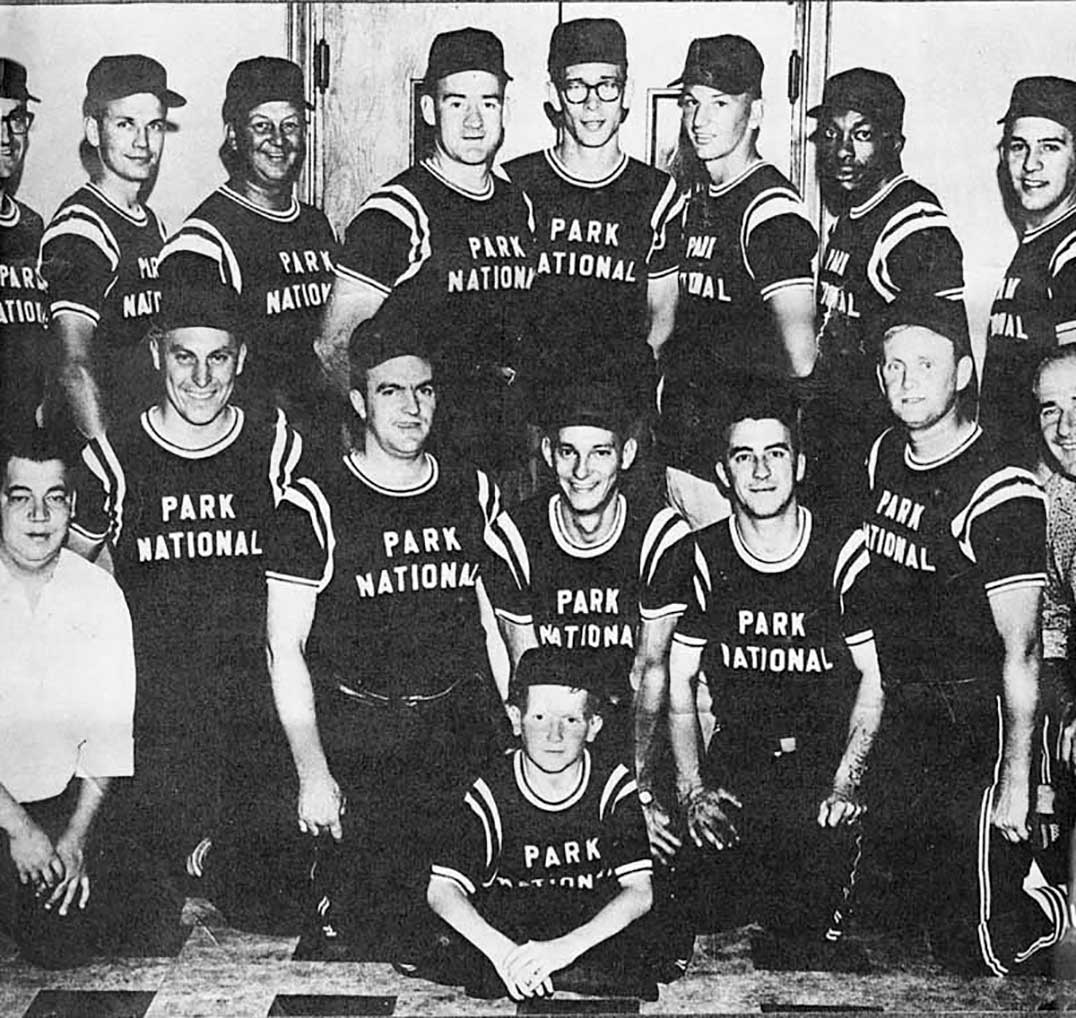
After he finished Grade 8 in separate school, run by the nuns, Mickey went to Sudbury Technical High School. Hockey continued to be important for the young man, playing defense in Intermediate A hockey with the Levack Huskies. Frank St. Marseille was his teammate; later Frank became a St. Louis Blues player.
After Mr. Page died, Mrs. Page moved them to a smaller house in Sudbury. Mickey was still in high school. One of his new neighbours was Al Arbour, who played with the Jr. Windsor Spitfires early in his career. “He told me we could play hockey at Sacred Heart College, as long a I would clean the ice afterwards. Al Arbour also played for Detroit and coached the New York Islanders to two Stanley Cup victories.
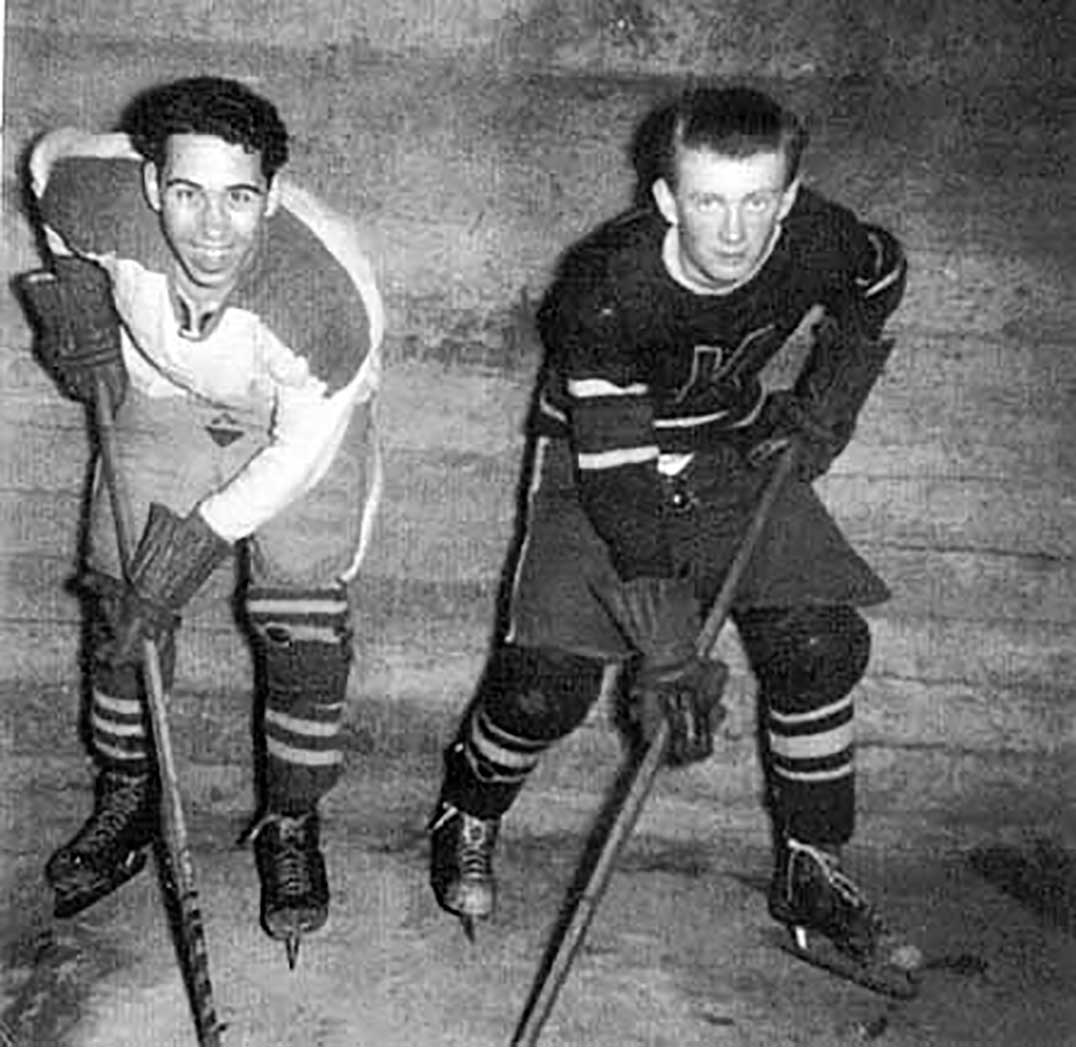
“I loved hockey but school, not so much. I wanted to drop out at one point. Mr. and Mrs. Wilf Gouin encouraged me to stay. They were neighbours and he moved into their home after both the Pages died. They insisted I would have to move if I quit school.” This French community was tightly knit and people supported each other. Mickey continued to play baseball and hockey. He also joined the Jr. Chamber of Commerce to learn more about the business world.
“It was the boxing manager at the Ontario Northland’s Baseball Team Club, Johnny Teale, that gave me the nickname Mickey. He kindly likened me to baseball great, Mickey Mantle at one point, and the nickname ‘Mickey’ stuck.”
His first summer job was caddying at the local golf course. “We got free golf and 35 cents per round if we carried a customer’s golf bag around the course. One old timer gave me 68 cents if I carried two bottles of dry gin for him. He called me Frenchie.”
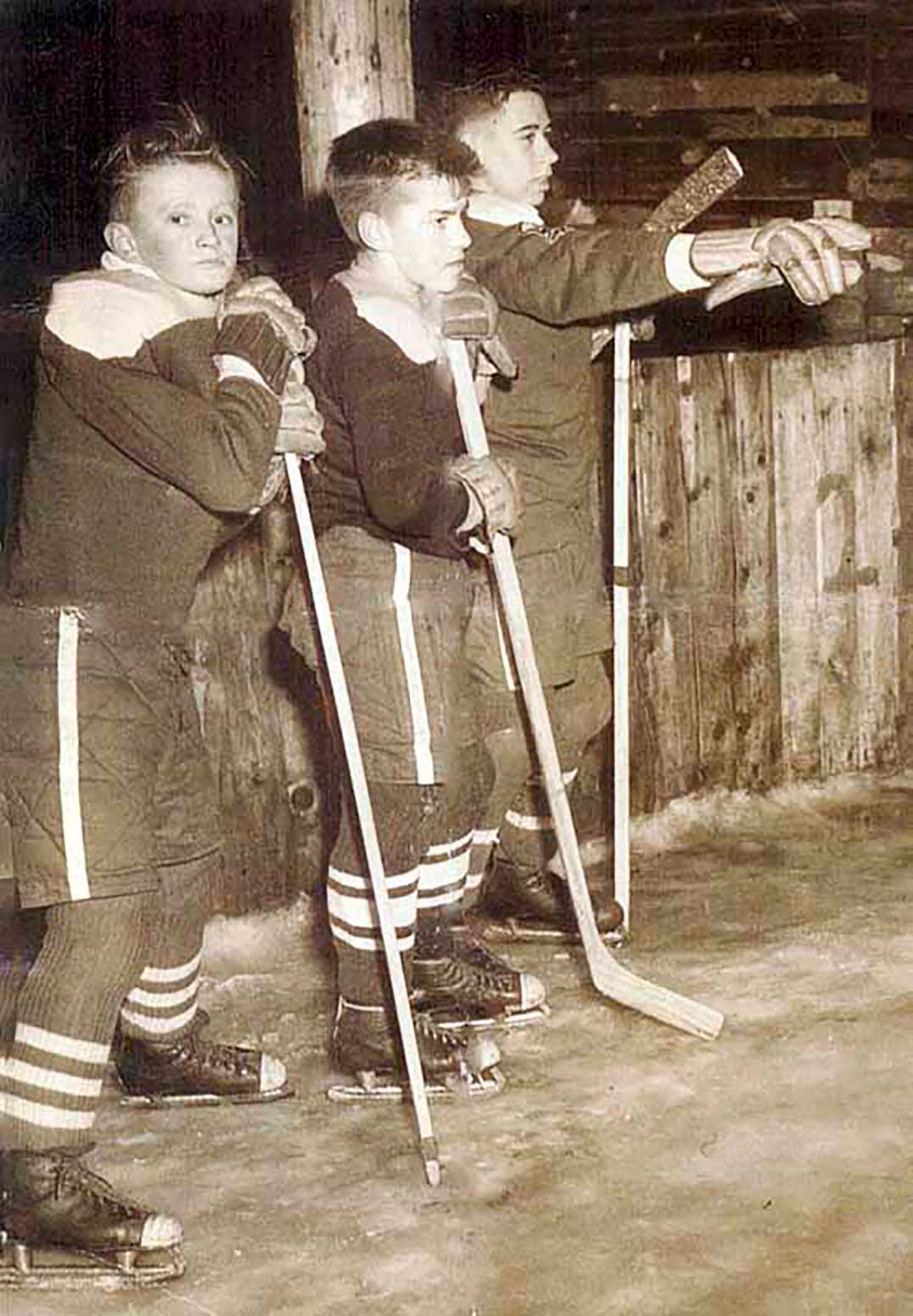
After graduating, Mickey got work at INCO. “I weighed just enough to make the cut,” he offers. “I enjoyed mining at the onset. It took 45 minutes to go down and come back up so we spent only six hours in the mines.” By that time, he was playing with the Levack Huskies and he eventually transferred to Levack from Frood Mine to be closer to the team. By then Mickey was married and had two sons, Perry and Gary, and a little girl, Debbie.
“Working at INCO proved to be challenging. I lost my partner, Mike Wochuk, while we were both below ground. He was trying to stabilize a pressure crack with a roof bolt and screening when a three and a half-ton chunk of rock split from the ceiling, knocked both of us off the trolley and buried him. The falling rock narrowly missed me as well. I tried so hard to pull him out but I could see that it was too late. The rock slide had crushed him. It was two hours before they could rescue us. That was one of the hardest things I have ever had to live through.”
Another test came a few months later when little daughter Debbie died tragically. ‘I was asleep after my night shift at INCO and my wife was in the kitchen preparing a meal. Little Debbie, three, stood up in her high chair, lost her balance and fell against the open screened window in our third floor apartment. The screen gave way and she plunged to the ground. It is hard to understand how something terrible like that can happen,” Mickey reflects. “She was such a sweet innocent child.” The marriage ended eight months later.
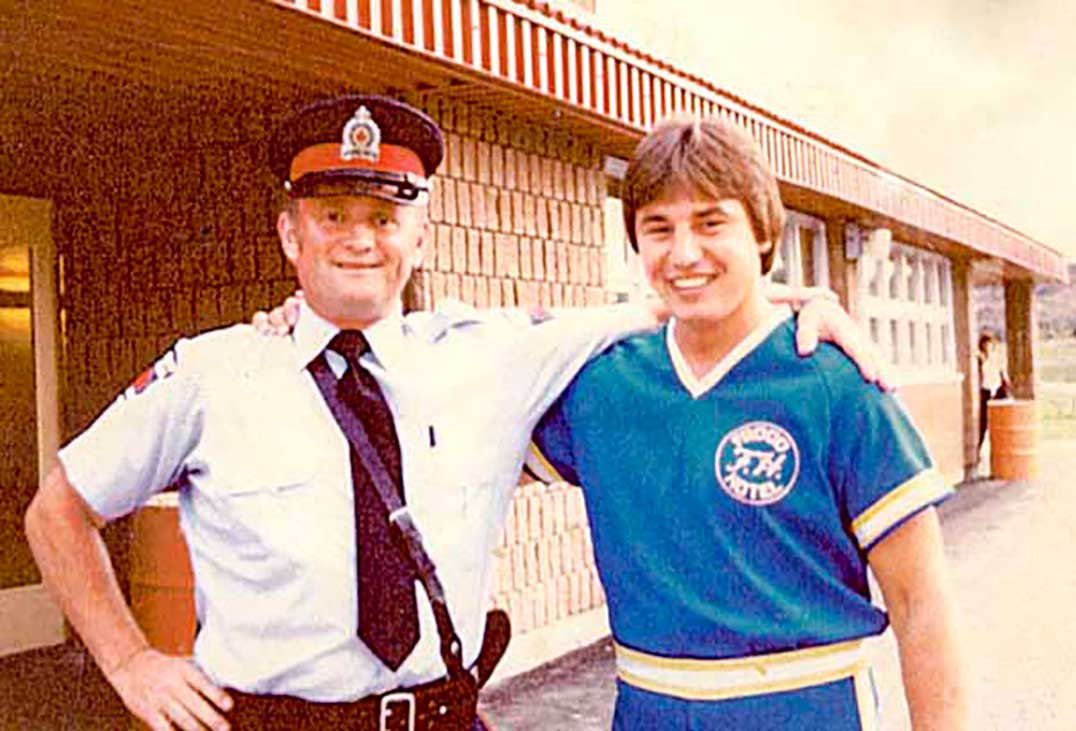
Mickey always had his skill for sports to fall back on. He played fastball with the Sudbury Park Nationals, this experience culminated with an opportunity to play in the World Championships in Clearwater Florida in 1961. He played first base and left field. Fellow teammates included Jim Pappin, Ray Jolicoeur, Kelly Campbell, Metro Szeryk and Booker Thomas. “Sadly, due to segregation laws, Thomas, one of our pitchers, had to stay in a different hotel and eat in a different restaurant. I found that very racist.” In 1965, his team won the Sudbury Park National Sr. A Fastball championship.
Mickey left INCO and became a salesman for Canadian Schenley selling liquor to bars in the north. “For two years, I wasn’t home much and I spent a lot of time in bars.” Golf became a favourite game and he won several championships, including the Donavan Open and the Sudbury Open Golf Tourney later in 1973, after he had left Schenley.
“When Schenley asked me to move to the main office in Quebec to start a new territory, in 1969, I decided to join the Police Force. My cousin, an inspector and Chief of Police, said that 10 officers would be hired the following week. I started as a uniformed constable, walking the beat at 10 below zero. I had to check locked doors of businesses and give tickets, when I worked traffic. That was hard because I knew so many people from hockey and they knew me.”
Mickey had been raised with some tough customers in the Flour Mill area so he understood the challenges. “I treated the accused and the victims with the same respect. The parents of the accused were innocent too and they deserved to be treated fairly. Sometimes I went to court, bringing information that would help deal fairly with the accused or the victim.”
With hockey still important to the police officer, he filled his spare time by coaching several teams over the years starting in 1979. He coached the Sudbury ‘Johnny Baby’ Pee Wees, winning a provincial championship. Dale McCourt and John Baby later played for the NHL. Coaching came naturally to Mickey. “I loved it but I had a short fuse when dealing with sports. Thankfully this did not carry into my working life.”
“These kids were easy to coach. They were so talented; some of their fathers had played pro hockey. One dad had coached the Sudbury Wolves. It was an all-star team and I just had to open the gate to let four players out at a time. They didn’t need much advice from me. The hard part was having to cut several kids if too many tried out. Many were very talented and wound up in the NHL. One was Al Secord of Espanola who played for Chicago and Boston, scoring more than 50 goals.”
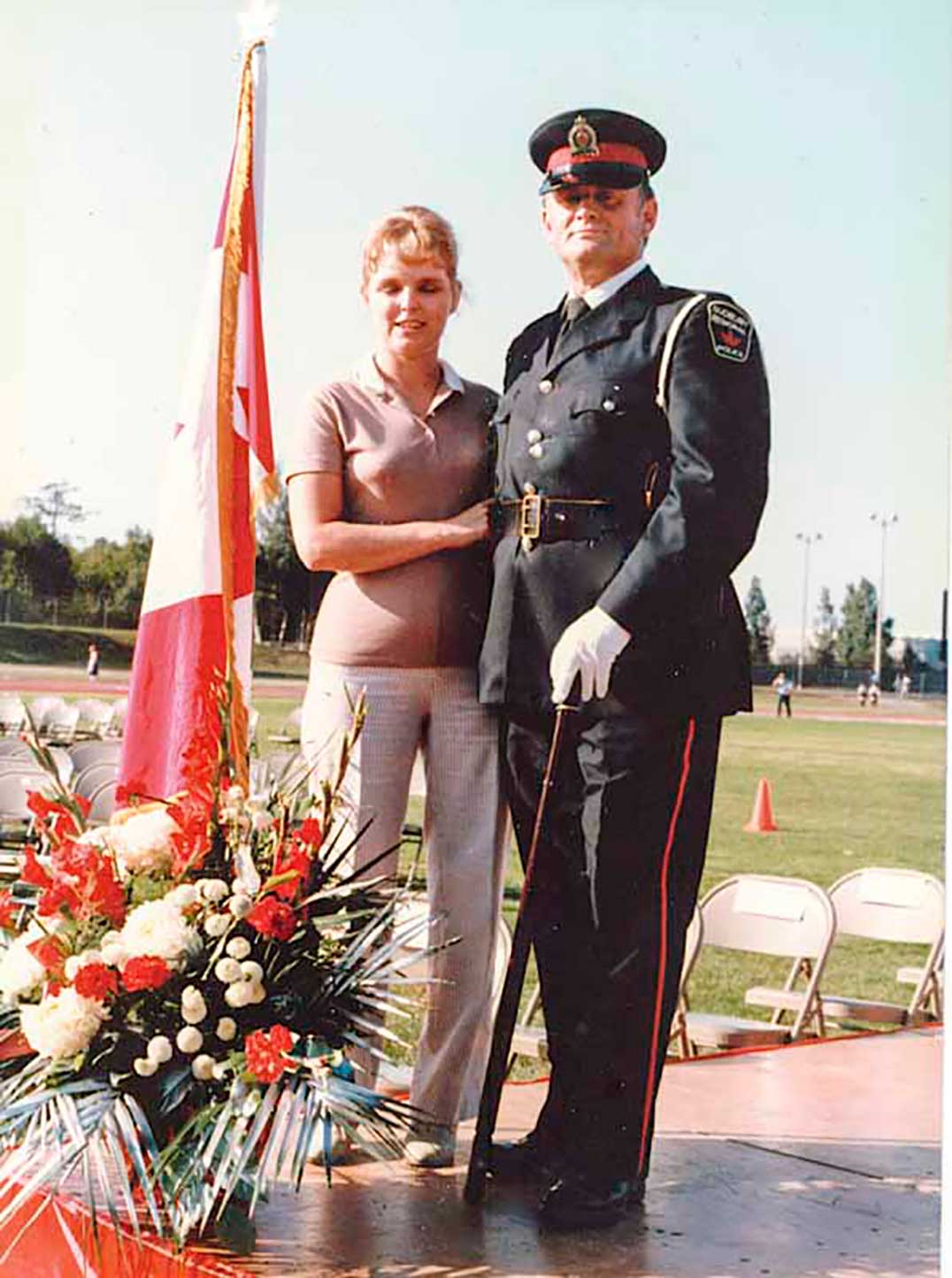
Mickey found a new life-partner, Cathy Cox, originally from Timmins. She had two sons of her own, Bruce and Dave. The two met when Cathy worked at the Royal Bank. Mickey was delivering free liquor samples to the staff manager at the bank. They met again in the context of a fatal accident at Laurentian University where Cathy was a student and worked part-time for the university’s security department. A student on a motorcycle was killed and Mickey, a police officer by then, was called to the scene. Cathy helped with traffic control.
The third encounter was in 1980 when Mickey became a detective and the boys went to the local bar to celebrate. Cathy was there with some friends of her own. After this meeting, the two decided to date. They married on December 30, 1980.
“Our new home was on three acres of land, on McFarlane Lake. It had a huge porch that held 50 wedding guests and a bar with a keg of draft beer.” The newlyweds honeymooned on Manitoulin with Warren and Audrey Haggart on Lake Manitou. The two couples remained close friends for many years. Mickey adds, “I soon became very fond of the boys and Fritz, Cathy’s white German shepherd. Fritz even helped out one time at the police station.”
Cathy was now the executive director of the Sudbury Industrial Training Centre (SITC) of Cambrian College. Mickey went on to join the OPP and the RCMP hockey teams about the time he became a homicide and robbery detective for the Sudbury Police Department. Mickey was sent to Aylmer Police College, and the RCMP College in Ottawa over two months for training. “One of the other detectives I worked with was Bob Finnell, a summer resident at Stanley Park now.”
“Warren Haggart, my partner for two years, also fished and hunted on Manitoulin. I would stay with him at Stanley Park. Occasionally the OPP would arrive on a weekend if I had to call my detachment. Often it turned out to be a natural death or a suicide and a ‘uniform’ could have dealt with it but they called me and my partner, to be sure.”
“I was involved with 13 homicides over as many years, with three of them at one time. We were called to a home to find a horrendous scene where the wife and two kids had been shot. We had to pick up the parents of the wife and take them to the morgue for identification. That was very hard. Later the husband was accused of their murder.” Another time Sgt. McKinney was part of the team that found the body of a missing 12-year-old girl in Naughton. She had been tied up and stabbed. We had to get the coroner and then tell the parents.” A young offender was later arrested by Mickey and Bob Finnell.
After an incident of this type, Mickey would attend homicide seminars and be debriefed by a psychiatrist to help dull the edges of those terrible memories. “One young officer, Constable Immamovich, had been first on the scene for the Constable Joe McDonald shooting in Sudbury. He had found his friend, dead, in the ditch. The young officer never returned to work and was found deceased two years later. The stress can be fearsome. All calls must be answered from a barking dog to a homicide. You always have to be ready.”
Different techniques were used for interviews. “I found using kindness, helped solicit cooperation. The technique of ‘good cop, bad cop’ was less effective. The tactic of kindness was used successfully by an OPP inspector with Canadian Army Colonel Williams who had murdered three or four women. He confessed.”
Mickey joined the Copper Cliff Lions Club and the Sudbury Police Association where he was vice-president for 12 years. He was approached by Father McKee, a friend of the chief, to play on their team, ‘The Sudbury Flying Fathers and Brothers.’ They asked him to bring two policemen with him. After some time on the team, Mickey was asked, “You boys are all Catholic?” He responded, “two of us are.”
In the locker room, a smiling Mickey approached the priest. “Brother, Haggart’s a protestant. I hope you don’t get rid of him.” ‘No’ was the response, ‘he’s too good a player’.” Mikey and Father McKee would often go on extra missions. They would regularly get used appliances from Roy’s and Yolles’ Furniture and give them to the poor. How could the proprietors of furniture stores refuse the pleas of a priest and a policeman?
“I found out I had a step-brother, Billy, when a young man was arrested in Sudbury for assault and drunkenness. Our mother had died. He told me that she had been placed in a nursing home and she always had a photo of a police officer on her bedside table. Rather than telling Billy he had a half-brother, she told Billy it was the brother of a good friend. She died without ever telling the family. It was reassuring for me to know that although she never contacted me, she must have followed my career and realized I had become a policeman.” Perhaps it was too hard to contact her son after so many years had passed. “Billy and I met again, later on.”
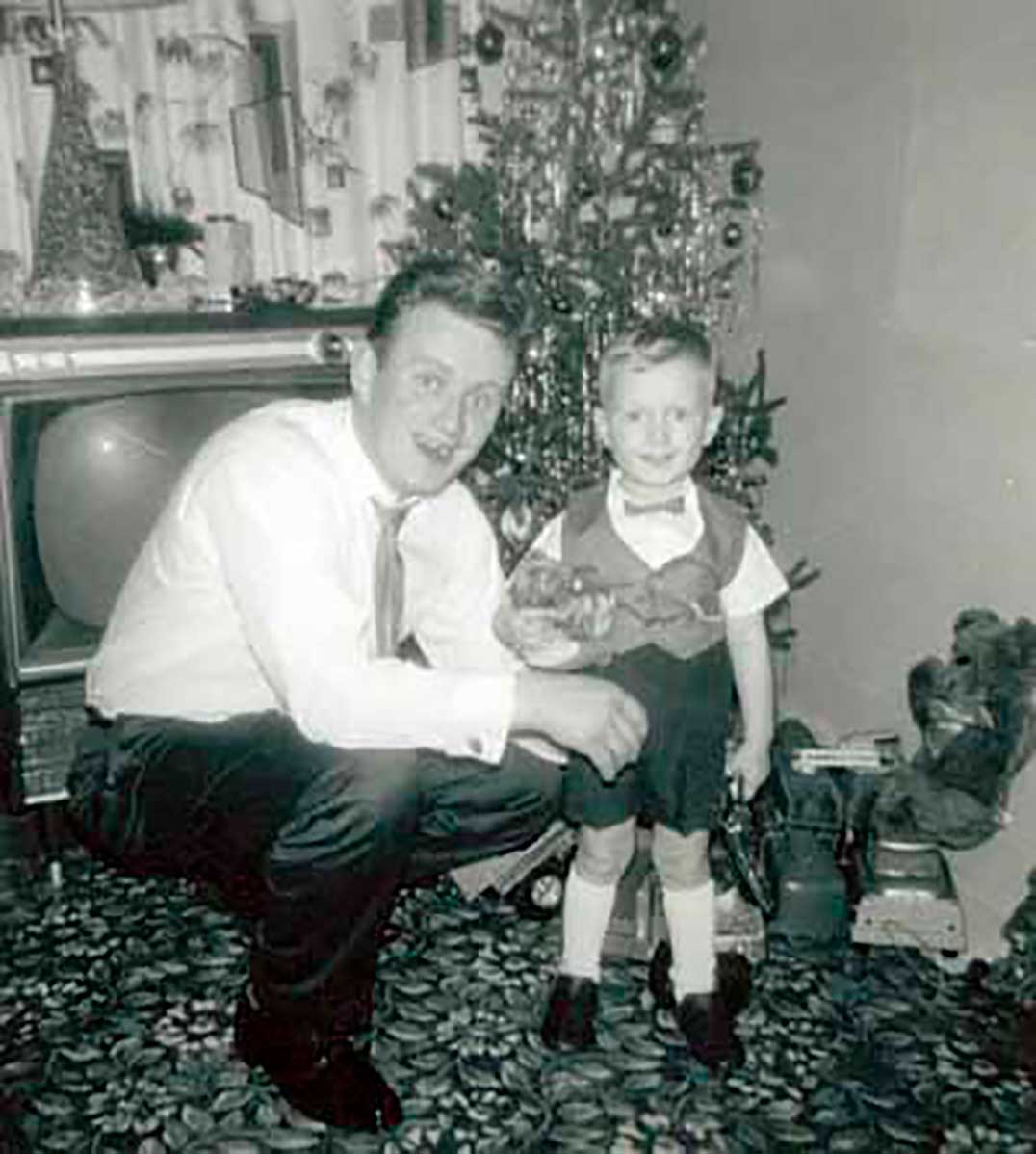
Cathy has two sons and three grandchildren. Son David is a radio announcer for CJMX. He and his wife Suanne, who works at Cambrian, have one daughter, Cynthia, who works for Air Canada. Cathy’s son Bruce teaches Grade 7 and 8 in Gore Bay. Mickey’s Perry works in sales for a pharmaceutical company. Perry’s son Chris is on the SWAT team for the Sudbury Police. Perry’s second son Gary taught Grade 12 Spanish and French at Lockerby High School until his retirement last June.
“We moved to Manitoulin soon after we bought our home on Lake Manitou on June 1, 1996. After so many years at Stanley Park, we wanted our own piece of paradise. Last year, Cathy had a stroke while we were in Florida. When we got back home, we were very impressed with Dr. O’Connor, who helped Cathy on her healing journey. The hospital and staff in Mindemoya are excellent. Cathy is recovering very well. We stayed in our Lake Manitou home for 20 years until recently when we moved to Mindemoya and rented a condo from Jeremy Gordon.”
Favourite television shows are ‘48 Hours’ and ‘Forensic Files.’ “We watch the Blue Jays, of course. Sports continues to interest me. We went to dinner with Randy Carlyle and his wife Cory. Randy had given me his Anaheim Ducks shirt after he had left that team. When he wound up back with the Ducks he asked for his shirt back,” Mickey explains, laughing. “It seems I still have it. Here it is.” The shirt was displayed bearing the logo of the Anaheim Ducks. “He never got it back.”
Warm memories remain from his chairing the opening and closing ceremonies for the Ontario Special Olympics when they came to Sudbury in 1993. “Cathy, Mike Derks, his mother and I made sure these Olympics ran smoothly and they did. Mickey also had the honour of being head security when Arnold Palmer and Lee Trevino played at Idylwyld Golf and Country Club in Sudbury in the mid 1980s.
Mickey’s last hockey team was the ‘Sudbury Wolves Old Timers,’ including team mates: Nick Tomiuk, Jerry Toppazini, Nick Evanshen, and John Baby Senior. Mentors for Mickey were Ray Golijcoeur of hockey and baseball fame along with Al Arbour, Jerry Topazini, Jim Pappin and Randy Carlyle.
“After my family, the church had always been important in my life, as a French Catholic, but after little Debbie fell to her death, I had trouble with my religion for a while. When I played hockey with the priests, I shared some of my concerns and doubts and they helped me deal with her death.”
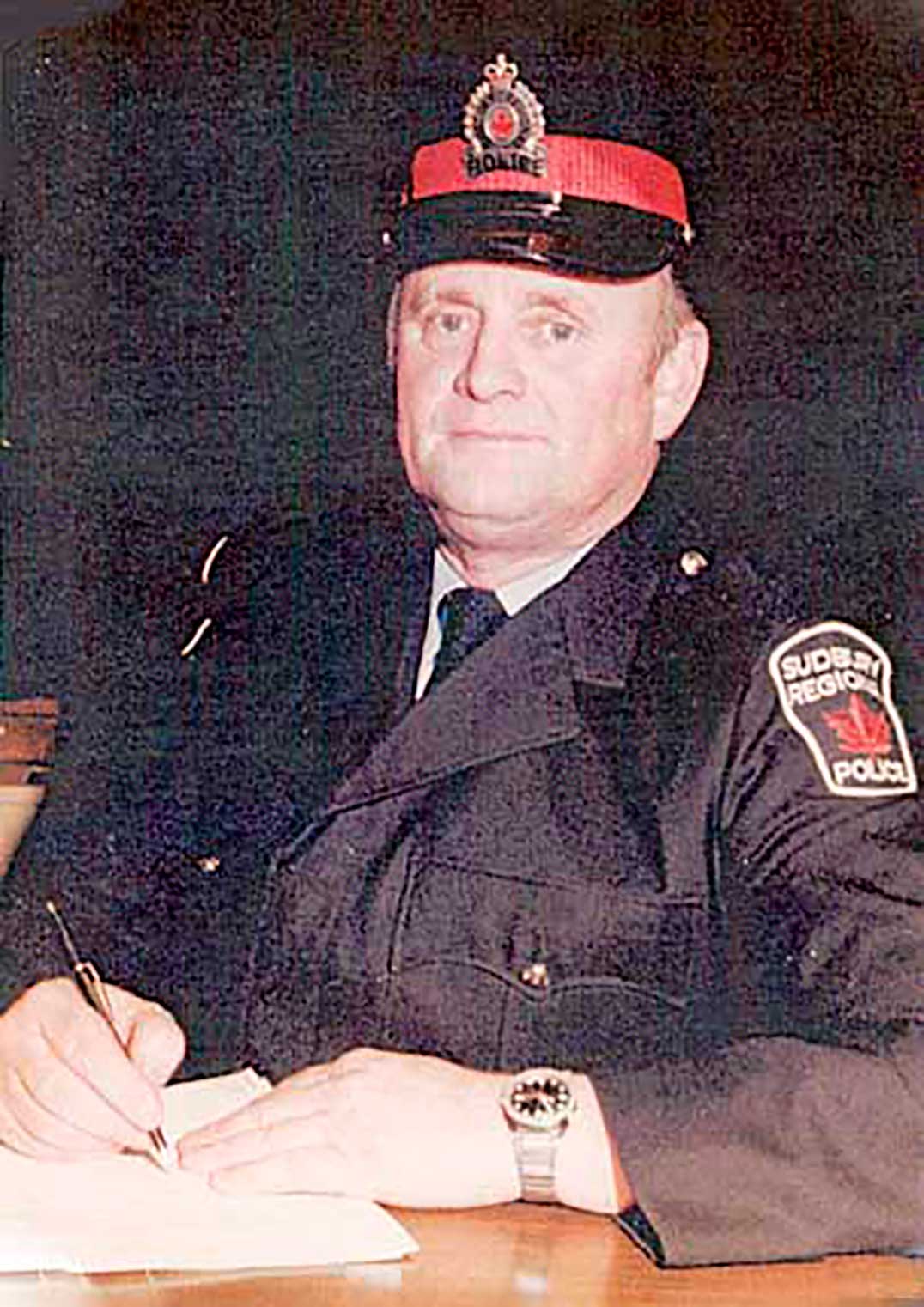
“Living in a seniors’ complex in Mindemoya makes us feel we are in ‘our waiting room for heaven’,” he adds, smiling. Luckily, 15 of the other officers I worked with live nearby including: Ron Golden, Gord Greenough, Colin Pick, Richard Morin, Jim Corrigan, Gil Lapierre, Rick Zimmerman and Murray Hammond in Gore Bay. Ray Corbiere, Rick Morin and Warren Haggart visit regularly. I still golf with 99-year-old Andy Watson and Claude Kerr. I hope we see him there on his 100th birthday,” he adds.
Cathy and I have good health and we live one day at a time. Panama City is our winter destination. We have lots of friends there. Perry has a place near Tampa and golfing is a favourite pastime down south too. Nevertheless, we can’t wait to get back to Manitoulin in the spring. We love Manitoulin. The beauty and the fresh air are wonderful. Colourful pheasants visit in the back. People are friendlier on the Island and the pace of living is slower. Island residents stop and say ‘hi’ in the grocery store, and wave from their cars, even if they don’t know you. This piece of paradise has been home to us for a long time now. We are happy here.”


